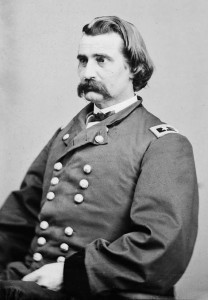John A. Logan stands as a pivotal figure in American history, not only for his distinguished service as a Union general during the Civil War but also for his instrumental role in establishing Memorial Day. His journey from a lawyer and politician to a celebrated military leader and advocate for veterans encapsulates a remarkable chapter in the nation’s past. This article delves into the life and accomplishments of John A. Logan, highlighting his contributions to both the battlefield and the remembrance of fallen soldiers.
From Illinois Politics to Civil War General
Born on February 9, 1826, in Jackson County, Illinois, John A. Logan’s early life hinted at a trajectory of public service. He served as a lieutenant in the 1st Illinois Volunteer Infantry during the Mexican-American War, although he did not experience combat. Returning to Illinois, Logan transitioned into law and politics, demonstrating his burgeoning leadership skills and powerful oratory. Elected to the U.S. House of Representatives as a Democrat in 1858, he became a staunch defender of the Union in the tumultuous years leading up to the Civil War. Despite representing a district with pro-secessionist leanings, Logan’s compelling speeches swayed public opinion, solidifying support for the Union cause within his constituency.
 John A. Logan: The founder of Memorial Day and Civil War General. Portrait from the Library of Congress archives.
John A. Logan: The founder of Memorial Day and Civil War General. Portrait from the Library of Congress archives.
“Black Jack” Logan: A Leader on the Battlefield
With the outbreak of the Civil War in 1861, John A. Logan’s commitment to the Union transcended words. He volunteered for military service and participated in the Battle of First Bull Run as an aide to a Michigan regiment. Quickly recognizing his potential, Logan returned to Illinois to raise the 31st Illinois Infantry, becoming its colonel. His dark hair, eyes, and complexion earned him the nickname “Black Jack,” a moniker that resonated with his troops and the public alike.
Logan proved to be a natural military commander. He led his regiment into its first action at the Battle of Belmont in November 1861 and continued to distinguish himself in key battles such as Fort Donelson, Corinth, and Vicksburg. His bravery and tactical acumen led to rapid promotions, culminating in his rank as major general of volunteers. During the Atlanta Campaign, Logan commanded the XV Corps and briefly led the Army of the Tennessee. Despite his battlefield successes, General William T. Sherman’s skepticism towards “political” generals led to Logan’s replacement by Major General O.O. Howard. This decision, based on prejudice rather than performance, deeply embittered Logan against professional soldiers, particularly those from West Point. Nevertheless, John A. Logan served faithfully under Sherman until the Confederacy’s surrender in April 1865. Many historians regard John A. Logan as one of the most effective “political generals” in the Union Army, a testament to his ability to combine political acumen with military leadership.
Championing Remembrance: The Genesis of Memorial Day
Beyond his military achievements, John A. Logan’s most enduring legacy may be his role in establishing Memorial Day. Following the Civil War, he was a driving force behind the creation of the Grand Army of the Republic (GAR), a powerful veterans organization for Union soldiers. Logan served as the second national commander of the GAR, advocating for veterans’ rights and remembrance.
On March 3, 1868, General Logan issued General Order No. 11. This order called for the establishment of a national day of remembrance to honor the Civil War dead by decorating their graves with flowers on May 30th. This day, initially known as Decoration Day, was directly inspired by Logan’s order and quickly gained widespread acceptance. Over time, Decoration Day evolved into Memorial Day, a national holiday honoring all Americans who have died in military service. John A. Logan’s initiative transformed a grassroots practice into a nationally recognized day of solemn remembrance and gratitude.
Post-War Politics and Lasting Impact
After the war, John A. Logan returned to the political arena as a Republican, serving in both the House and Senate. His political career reached a high point when he was nominated as the vice-presidential candidate on the Republican ticket with James Blaine in 1884. Although they were unsuccessful in the election, Logan remained a prominent figure in American public life until his death on December 26, 1886. He is buried at the United States Soldiers’ & Airmen’s Home National Cemetery in Washington, D.C.
John A. Logan’s life exemplifies dedication to country and a profound commitment to honoring military service. From his contributions on the Civil War battlefields to his pivotal role in establishing Memorial Day, his legacy as a soldier, politician, and champion of remembrance remains firmly etched in American history. His name is forever linked with the solemn day of tribute to the nation’s fallen heroes.
